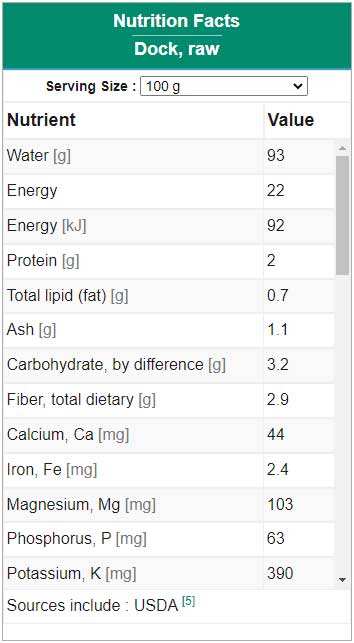
The health benefits of sorrel may include its ability to improve eyesight, slow aging, reduce skin infections, strengthen the immune system, and improve digestion. It may also build strong bones, increase circulation, boost energy levels, lower blood pressure, increase appetite, and strengthen heart health.
What is Sorrel?
Sorrel (Rumex acetosa) is a fascinating perennial herb that is used all around the world and is cultivated for a wide variety of uses. Although due to its sharp, tangy taste it is primarily grown for use in food, it also has a vast array of health benefits associated with it.
There are many varieties of sorrel that grow in different regions of the world, and while many of them have slightly different characteristics and associated health benefits, they are generally the same. The most commonly cultivated and used variety is also referred to as sorrel, spinach dock, and narrow-leaved dock. It may be easy to confuse it with roselle (Hibiscus sabdariffa), which is known as Jamaican sorrel or Guinea sorrel. The latter is used to make sorrel tea or hibiscus tea. [1]
The plant itself has broad green leaves that comprise a majority of the surface area, but the roots stretch deep into the ground. The red and purple flowers that annually bloom are one of the best ways to identify sorrel.
Cultures around the world have been growing and using it for centuries, in everything from soups and salads to vegetable side dishes and teas. The high content of oxalic acid in sorrel makes it poisonous if consumed in large quantities, so intake should be limited. In smaller quantities, eating sorrel is completely harmless. The oxalic acid is also responsible for the tart and tangy taste that is almost reminiscent of wild strawberries or kiwi. The leaves are a major part of the plant and are eaten or used in culinary preparations. Sheep’s sorrel is also a key element in some different tea preparations due to its strong antioxidant compounds, including the famous Essiac tea. [2] [3] [4]
Sorrel Nutrition Facts

According to the USDA, one cup of raw sorrel (dock) contains 29 calories, 4.3 grams of carbohydrates, and 2.6 grams of protein. It also provides a significant amount of fiber (3.8g). In terms of vitamins and minerals, it is rich in vitamin C and also contains vitamin A, iron, magnesium, potassium, and calcium. In terms of beneficial organic compounds, it contains polyphenolic acids, flavonoids, and anthocyanins. [6] [7]
Health Benefits of Sorrel
Let’s look at the health benefits found in sorrel that make it such a wonderful addition to your diet.
May Be Rich in Fiber
The high content of dietary fiber can be found in most varieties of sorrel. This means that your digestive health can be improved by adding these leaves to your soups and salads. Dietary fiber adds bulk to food as it moves through the digestive system, improving your gastrointestinal health and reducing conditions like constipation, diarrhea, bloating, and cramping, as well as other gastrointestinal issues. Soluble dietary fiber can also help reduce total cholesterol in the body, thereby protecting heart health, and reducing the chances of atherosclerosis, heart attacks, and strokes. [8] [9]
May Aid In Regulating Blood Pressure
Sorrel may have a very significant level of potassium (1 cup contains 15% of your daily recommended intake), which is an essential mineral for human health. Potassium is a vasodilator, hence it is instrumental in maintaining fluid balance throughout the body. This means that it reduces stress on the cardiovascular system by relaxing the blood vessels and arteries. Lowered blood pressure reduces the chances of dangerous blood clotting and excessive strain on the heart that can lead to coronary heart disease and other complications. It can reduce the risks of hypertension and even possibly stroke, as seen by preliminary data conducted in a rat model. [10] [11]
May Help Maintain Vision Health
Vitamin A, another essential vitamin said to be found in sorrel, has been closely connected to eyesight improvement and a reduction of macular degeneration and cataracts. Beta-carotene, which is a precursor to vitamin A, acts as an antioxidant, and when combined with the other important antioxidant compounds in the body, it can greatly boost eye health, especially night vision, and prevent age-related degradation. [12] [13]
Can Be A Good Source of Iron
The significant levels of iron in sorrel may boost red blood cell production and prevent iron deficiency anemia. Iron is necessary for your red blood cells to carry oxygen from the lungs to the rest of the body. Increased circulation of oxygen throughout the body in the vital organs boost hair growth, increase energy levels, and speed up the healing process (in conjunction with the protein content of sorrel). [14] [15]
Might Help Boost Immunity
The potential vitamin C content in sorrel is impressive. A single cup of sorrel contains 106% of your daily recommended intake, which can help optimize your immune system. Vitamin C, also known as ascorbic acid, supports the skin’s function as a barrier against pathogens and protects against environmental oxidative stress by optimizing oxidant scavenging activity of the skin. [16] [17] [18]
May Help Soothe Skin Conditions
The leaves of sorrel have been used in two ways to soothe skin conditions. The leaves, when dried as an herb, can be eaten, and this has been connected with a reduction in ringworm and itchy, dry skin. When fresh leaves are ground up, the liquid extracted can be applied topically to the infected area to reduce rashes and irritation. This is likely due to vitamin C and vitamin A content in the leaves, as well as the other nutraceuticals found in this herb. [19] [20] [21]
Can Help in Boosting Heart Health
Sorrel belongs to the oxalis family, which has been closely associated with boosting heart health in general. This is likely due to the antioxidant and anti-inflammatory activity of anthocyanins and other compounds found in sorrel, which may help reduce oxidative stress thereby protecting the cardiovascular system and other chronic cardiac diseases. [22] [23]
How To Use Sorrel?
Due to its unique tart taste, sorrel is best enjoyed in a salad or as a herb in salad dressings. It can also be used in soups or stews. While the lemony taste of the leaves does become milder once cooked, it still packs as a punch as a side dish to fish or a roast chicken.
For a simple sorrel herb dressing, you can blend a handful of sorrel leaves and a handful of basil leaves with ½ cup of olive oil and ¼ cup of apple cider vinegar. Season with salt and pepper. You can drizzle this over fresh salad leaves or grilled fish. Enjoy!
Word of Caution: Oxalic acid is a toxin, moderate consumption of sorrel is necessary. Also, oxalic acid contributes to the growth of kidney stones, so if that is already a health concern, you should avoid eating oxalic acid-rich foods like sorrel. Also, when cooking it, do not use cast iron or aluminum cookware, as the metal will interact with oxalic acid and cause the herb to take on a very unpleasant metallic taste. [24] [25] [26]
Important Notice: This article was originally published at www.organicfacts.net by John Staughton (BASc, BFA) where all credits are due. Medically reviewed by Emily Borth(MS, RDN)
Disclaimer
The watching, interacting, and participation of any kind with anything on this page does not constitute or initiate a doctor-patient relationship with Dr. Farrah®. None of the statements here have been evaluated by the Food and Drug Administration (FDA). The products of Dr. Farrah® are not intended to diagnose, treat, cure, or prevent any disease. The information being provided should only be considered for education and entertainment purposes only. If you feel that anything you see or hear may be of value to you on this page or on any other medium of any kind associated with, showing, or quoting anything relating to Dr. Farrah® in any way at any time, you are encouraged to and agree to consult with a licensed healthcare professional in your area to discuss it. If you feel that you’re having a healthcare emergency, seek medical attention immediately. The views expressed here are simply either the views and opinions of Dr. Farrah® or others appearing and are protected under the first amendment.
Dr. Farrah® is a highly experienced Licensed Medical Doctor certified in evidence-based clinical nutrition, not some enthusiast, formulator, or medium promoting the wild and unrestrained use of nutrition products for health issues without clinical experience and scientific evidence of therapeutic benefit. Dr. Farrah® has personally and keenly studied everything she recommends, and more importantly, she’s closely observed the reactions and results in a clinical setting countless times over the course of her career involving the treatment of over 150,000 patients.
Dr. Farrah® promotes evidence-based natural approaches to health, which means integrating her individual scientific and clinical expertise with the best available external clinical evidence from systematic research. By individual clinical expertise, I refer to the proficiency and judgment that individual clinicians acquire through clinical experience and clinical practice.
Dr. Farrah® does not make any representation or warranties with respect to the accuracy, applicability, fitness, or completeness of any multimedia content provided. Dr. Farrah® does not warrant the performance, effectiveness, or applicability of any sites listed, linked, or referenced to, in, or by any multimedia content.
To be clear, the multimedia content is not intended to be a substitute for professional medical advice, diagnosis, or treatment. Always seek the advice of your physician or other qualified health providers with any questions you may have regarding a medical condition. Never disregard professional medical advice or delay in seeking it because of something you have read or seen in any website, video, image, or media of any kind. Dr. Farrah® hereby disclaims any and all liability to any party for any direct, indirect, implied, punitive, special, incidental, or other consequential damages arising directly or indirectly from any use of the content, which is provided as is, and without warranties.








